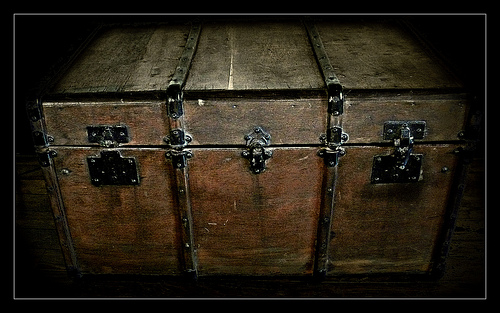Do not store up for yourselves treasures on earth, where moth and rust consume and where thieves break in and steal; but store up for yourselves treasures in heaven, where neither moth nor rust consumes and where thieves do not break in and steal. For where your treasure is, there your heart will be also. (Matthew 6:19-21, NRSV)
This verse has taken on a new meaning for me since I got to Belize. In this tropical climate, things, stuff, objects, don’t last very well. They break, they fall apart, but most of all, they mold. I didn’t believe people when I first got here. I thought, surely, my things would be the exception. But after a week of living in our small Belizean house, I started to see the effects of living in a tropical climate. My books started to grow mold, the clothes in my closet, my favorite shoes, my pink wallet, even my pillow (yuck)!
I grew up with the notion that I needed to accumulate stuff, and accumulate often.
I bought new clothes at least twice a year, but usually more than that. I did what most American teens do; I went shopping for fun. I never quite kept up with the latest fashions, but I certainly felt the pressure to do so. I grew up in a culture of consumerism, where advertisements were everywhere and “keeping up with the Joneses” was kinda for real.
All of these things are not bad in and of themselves, but here’s the problem: many of the objects I was buying (clothes, for example) were made in foreign countries by impoverished people in unsafe conditions. Some were made by children who had to work long hours in countries that have little to no child labor regulation. Others were made by people who had been trafficked and held against their will: modern-day slaves. I bought these things with no knowledge that my purchases were actually helping others around the world to stay oppressed.
Not only that, but I have come to realize that an addiction to consumerism has a negative impact on me. The many advertisements we are bombarded by in North America send us messages about how we need this shampoo or that pair of shoes to feel better, to look prettier, to be more popular. These messages seep into us from an early age, and if we are not aware of them, we may not even realize how much they affect our day-to-day decisions.
Since college, when I started learning about issues of social justice, I have been making (or trying to make) a slow but steady transition out of consumerism. College was when I first learned that our consumerism comes at a price for the rest of the world. Now, stepping out of the culture I grew up in, into a place where accumulating just means more mold, I gain some more perspective.
I realize how little I actually need.
I showed the Story of Stuff to a class I taught recently. Re-watching this short video reminded me why I have tried to make changes in my own life in the first place.
We North Americans, addicted to materialism, are often blissfully ignorant of the effect that this addiction has on ourselves and throughout the world.
Sometimes it takes being put into a new situation to take new steps and see things more clearly. I am not saying I will never shop again, but I certainly am forced to think more carefully about my purchases, and I hope that this will be something I continue wherever I am living. I try to buy secondhand, to check how ethical each company is in the Better World Handbook Shopping Guide or Free to Work (yes, there is even an app for that), and to advocate for change on these issues. These websites and apps rate companies on factors such as how well they treat their workers, how eco-friendly they are, and how much conflict is caused by the production of their materials.
to loose the bonds of injustice, to undo the thongs of the yoke, to let the oppressed go free, and to break every yoke (Isaiah 58:6, NRSV).
I have come to realize that minimizing my stuff is a part of how I can ensure social justice. Whether in a tropical climate, or back in Pennsylvania where things last longer, I hope to continue learning how to love my neighbors all over the world.
What are some ways you can love your neighbors better?
Micalagh Beckwith Moritz is a social worker, writer, wife, sister, daughter, community member, continually learning how to do a better job at each of these roles. She is always contemplating how to love others better and to enjoy the small things of life; to see God in everything and everyone. She is passionate about caring for the environment, experiencing new cultures, and also important, eating cheese. She currently lives in Belize and has the privilege of teaching and learning from college/university students! She works with a Christian study abroad program: Creation Care Study Program (CCSP). Micalagh blogs at Only Small Things.



